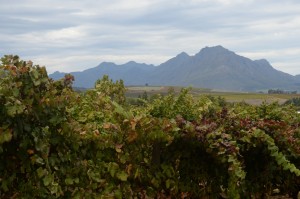 It is really fun to taste the different Pinotages and compare them with each other. This is hardly possible to this extent with other, more popular grape varieties, as the range of Pinotages is still (almost) manageable, because the vine - bred in Stellenbosch in 1924 - is actually only cultivated and pressed in South Africa. So I am (perhaps) gradually gaining a very broad overview and getting to know at least one grape variety - in all its variants. Those who don't know Pinotage, or - like so many - have already drunk (or tasted) Pinotage, but "just none that really inspires me, even at the South Africa tasting of the Mitteldeutsches Weinforum there were more exciting things than that, where Pinotage was in it" (quote from T.H), will perhaps be bored if I tread the nature trail through this grape variety more often. But I actually try to tell stories in my "Drunk", and the story around Pinotage - which I like very much, by the way - is worth telling. Especially because you can delve a little deeper into the grape variety, the terroir, the taste, the vinification, etc.
It is really fun to taste the different Pinotages and compare them with each other. This is hardly possible to this extent with other, more popular grape varieties, as the range of Pinotages is still (almost) manageable, because the vine - bred in Stellenbosch in 1924 - is actually only cultivated and pressed in South Africa. So I am (perhaps) gradually gaining a very broad overview and getting to know at least one grape variety - in all its variants. Those who don't know Pinotage, or - like so many - have already drunk (or tasted) Pinotage, but "just none that really inspires me, even at the South Africa tasting of the Mitteldeutsches Weinforum there were more exciting things than that, where Pinotage was in it" (quote from T.H), will perhaps be bored if I tread the nature trail through this grape variety more often. But I actually try to tell stories in my "Drunk", and the story around Pinotage - which I like very much, by the way - is worth telling. Especially because you can delve a little deeper into the grape variety, the terroir, the taste, the vinification, etc.  vinification etc. This Pinotage in particular - from the Beyerskloof winery - is a lesson for me on the subject of taste: it is the winery's "small Pinotage" (approx. 15 CHF), which as a rule hardly reaches the "upper ranks" (90/100 and more points, at Platter 4.5 and more stars) in the various wine guides (incl. Platter), but usually has to "pass through at the bottom" (around 87/100), while the winery's top Pinotage (approx. 26 CHF) easily reaches 90/100. The more expensive Pinotage is - undoubtedly - the more demanding (older vines, 14 months in barrel, etc.); but is it also the better one? Is the more rustic little one not more Pinotage? Does Pinotage always have to be made the way it tastes to the majority? Namely (almost) like many other grape varieties: "dense purple red. Intense aromas of blackberries and red fruits finely underlaid with the wood notes of the ageing..."? Or may (should, could) a Pinotage possibly also be described like this: with: "pepper, tar and fruit-juice-on-hot-baking-sheet notes" (in J.K.'s comment on one of my "drinks")? I admit - and I'm probably completely off the mark in terms of taste - I like the "little one" much better, even though I have tasted - in this direction - far better Pinotages. The Pinotage 2011 - as I have it in the glass now - has too little power, is too ambiguous, has a bit of everything, but it still doesn't form a clear taste picture. Friendly, I am tempted to say, plain, simple, and friendly.
vinification etc. This Pinotage in particular - from the Beyerskloof winery - is a lesson for me on the subject of taste: it is the winery's "small Pinotage" (approx. 15 CHF), which as a rule hardly reaches the "upper ranks" (90/100 and more points, at Platter 4.5 and more stars) in the various wine guides (incl. Platter), but usually has to "pass through at the bottom" (around 87/100), while the winery's top Pinotage (approx. 26 CHF) easily reaches 90/100. The more expensive Pinotage is - undoubtedly - the more demanding (older vines, 14 months in barrel, etc.); but is it also the better one? Is the more rustic little one not more Pinotage? Does Pinotage always have to be made the way it tastes to the majority? Namely (almost) like many other grape varieties: "dense purple red. Intense aromas of blackberries and red fruits finely underlaid with the wood notes of the ageing..."? Or may (should, could) a Pinotage possibly also be described like this: with: "pepper, tar and fruit-juice-on-hot-baking-sheet notes" (in J.K.'s comment on one of my "drinks")? I admit - and I'm probably completely off the mark in terms of taste - I like the "little one" much better, even though I have tasted - in this direction - far better Pinotages. The Pinotage 2011 - as I have it in the glass now - has too little power, is too ambiguous, has a bit of everything, but it still doesn't form a clear taste picture. Friendly, I am tempted to say, plain, simple, and friendly.